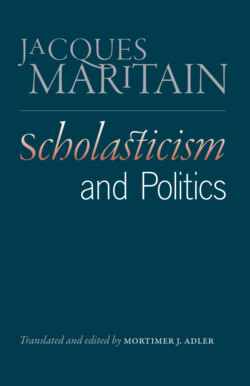Читать книгу Scholasticism and Politics - Jacques Maritain - Страница 16
На сайте Литреса книга снята с продажи.
VII PHILOSOPHY OF NATURE
ОглавлениеI still have to indicate, before concluding this chapter, that in the Thomist perspectives, metaphysics does not constitute the whole of speculative philosophy, but only its highest category.
Below metaphysics and above the sciences of the empiriological type, there exists another degree of knowledge, that of the philosophy of nature. The philosophy of nature knows the same world as the empiriological sciences, the world of change and movement, of sensible and material nature; but the resolution of concepts is made here in intelligible being, not in the observable and the measurable as such. Here, again, the intellect perceives being abstractively, but not, this time, being according to its proper mystery; it perceives being in so far as the latter is invested with material motion and according to the proper mystery of the world of becoming; and it is clear that, if human intelligence is capable of abstractive intuition, it must exercise this power first in that order which is most connatural to human intelligence, namely, the order of sensible nature. A philosophical knowledge of movement, of transitive action, of corporeal substance, of living organism, of sensitive life, helps thus to complete, by proceeding according to an entirely different noetic type and conceptual lexicon, the empiriological notions obtained about nature by the sciences of phenomena and of experimental detail,—that is, by science in the modern sense of the word.
I will not dwell here further on the problems relative to the philosophy of nature. I shall end this discussion by repeating that, notwithstanding their opposition, neo-positivism and dialectical materialism lead, by different ways, to certain common negations. If either of them is right, there is only one science, the science of phenomena, pure and even purist in one case and, in the other case, carried away by the great dialectical fantasy. And there is no wisdom. Blinded by logical empiricism or hallucinated by historical explanation, the intellect is a slave in the service of sensitive apprehension.
If Thomism is right, all the truth that neo-positivism has discerned concerning the sciences of phenomena is maintained and saved, just as is all the truth discerned by dialectical materialism concerning the movement of history and the evolution of the social concrete. But above the sciences of phenomena, there are other categories of science which are categories of wisdom, because they reach, in its very mystery, and yet in quite different ways, being itself, that being after which the intellect thirsts and hungers. And above the work of man in time, accomplished in order to subjugate material nature and eliminate from society the forms of servitude—above this work, there is the activity of man in the eternal, an activity of wisdom and of love, by which the intellect and the heart of man interiorize to themselves an infinite good, not dominated, not capable of domination, but which finally gives its self as the object of fruition.
